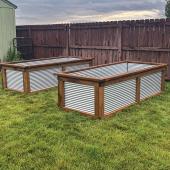Follow Your Nose
While the blooming green landscape around town is beautiful in the summertime, it invariably means that allergy-inducing pollen will assault us until fall. We breathe in pollen, and it triggers our immune system which tries to protect us like an overzealous bodyguard. Pollen-specific antibodies cause the release of histamine, which causes our nose to run, our eyes to itch, and other unpleasant other symptoms of allergies.
There are several over-the-counter options to combat this seasonal discomfort. Common allergy medications like Benadryl, Claritin, and Allegra are anti-histamines. They do not seek out and destroy histamine like a drone; rather, they sit in a receptor on the cell membrane so histamine cannot bind and trigger the water works. The immune system is still reacting, but the end result is blocked. Side effects include drowsiness, headaches, nervousness, and increased heart rate. Long-term regular use can be hard on the liver and kidneys. Flonase is a corticosteroid nasal spray that suppresses the immune system and inflammation. When the effects wear off, users can experience rebound swelling. This creates a vicious cycle of needing more Flonase.
There is no question the medications block the symptoms, but if we make our immune system less trigger-happy, we can reduce the need for them. Roughly 80 percent of our immune system lines our digestive tract. If the foods we are eating are constantly stirring up our immune system like a hornet’s nest, it will react quicker and more aggressively to other irritants like pollen. Lab tests for pollen antibodies can help identify problematic foods. Eating more antioxidant-rich foods, such as vegetables and fruits, helps strengthen the cell membranes, making mast cells less likely to release histamine. Vitamin C, vitamin E, vitamin A, and quercetin—a plant-derived flavonoid—all help with this.
We can reduce our inflammation by eating more omega-3 essential fatty acids (EFAs) found in wild-caught fish, grass-fed meat, walnuts, flax, chia, and pumpkin seeds. Help out your diet even further by reducing omega 6 EFAs from farm-raised fish, grain-fed meat, corn/soy products, and partially hydrogenated fats like margarine and Crisco.
Homeopathic combos found in the grocery-store health section contain every homeopathic remedy ever used for allergies. It’s a shotgun approach, with the hope that one of them will help—which it sometimes does and sometimes doesn’t. A prime example is the acclaimed allergy solution of eating local honey. People can be stricken with allergies for different reasons—the most effective approach is to prescribe homeopathics, herbals, diet changes, and other treatments based on the details of each case and what the individual person needs.
Lou Walters is a naturopathic physician at The Source Wellness Center in Bozeman.












